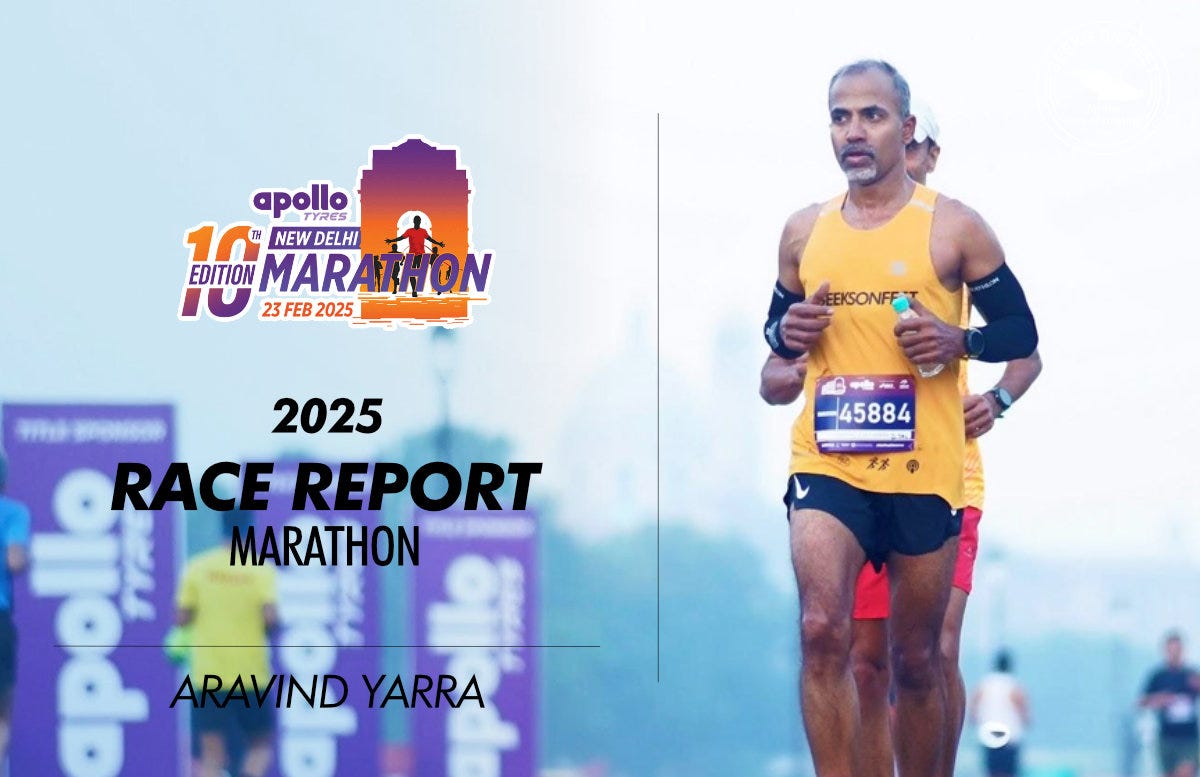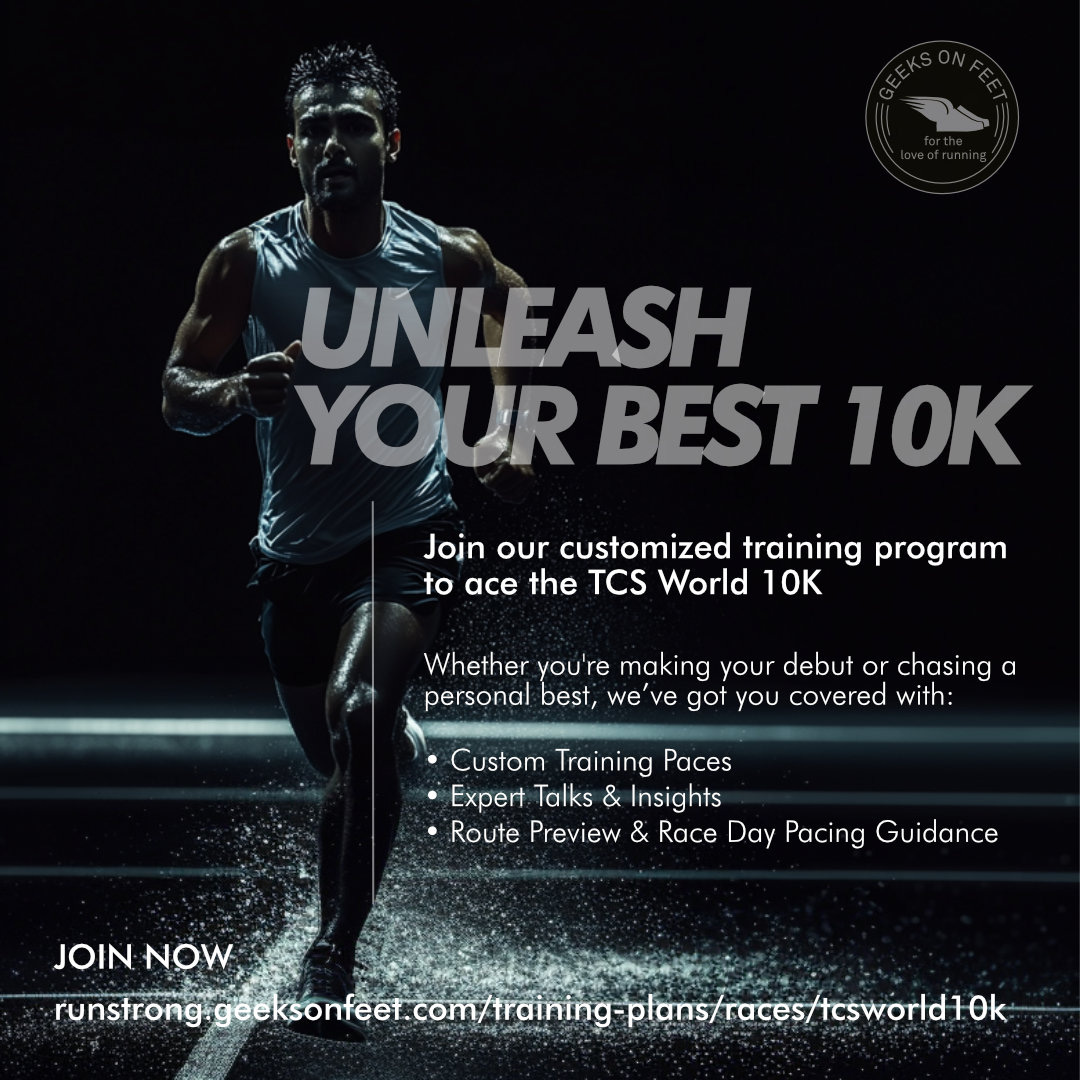Race report, Norwegian singles method, reverse crunches, and more!
#WhatsUpThisWeek?
Discover the Norwegian Singles Method, a novel training approach tailored for shorter endurance distances, at #GeeksOnFeet
Aravind ran the New Delhi Marathon in 3:18:51, getting him, his BQ and PB, read through his 12 weeks training in his race-report at #GeeksOnFeet
Reverse crunches help in improving core strength and running form. More in this week's #WOW
Ethiopia's Tadese Takele and Sutume Asefa Kebede top the podium in Tokyo; this and more at #RunSHORTS
Happy Reading!
#GeeksPoll
Imagine you just crossed 32nd km, your legs are tired, and doubts start creeping in. It is ten more to the finish line.
Runners, what's your toughest mental battle in this final stretch?
The results of last week's poll on how long runners take to sign up after a race are here.
#WoW - Reverse Crunches
Reverse crunches are a functional exercise that can complement a runner’s training routine by improving core strength and running form.
How to do it?
Lie flat on your back on a mat with your legs extended straight in front of you.
Keep your arms at your sides with palms facing down for stability.
Engage your core and glutes. Lift both your legs towards the the ceiling and, without jerking your back, bend at the knee slightly while lifting and then bring it back in the starting position without touching the feet on the floor
Continue this movement 10 to 12 times
When to do it?
Include this as part of your strength training with 2 to 3 sets of 10 - 12 repetitions
@GeeksOnFeet:
Norwegian Singles Method
Discover the Norwegian Singles Method—a novel training approach tailored for shorter endurance distances from 5K to Half Marathons. This method focuses on boosting your threshold pace, the speed at which you can sustain near your lactate threshold. By training at sub-threshold paces, you enhance your body’s ability to both generate and clear lactate, pushing the limits of your speed and endurance. The method emphasizes targeted threshold interval workouts with brief 60-second rests, ensuring that quality work comprises only 20–25% of your weekly mileage, while easy runs build your aerobic base. Whether you’re gearing up for a 5K or a Half Marathon, this structured approach can help raise your racing threshold and elevate your performance. For a more detailed look at how to use the method and sample training workouts, read the full article here.
Race Report: New Delhi Marathon 2025 by Aravind
Aravind ran the New Delhi Marathon with a 3:18:51 finish. He used a positive split strategy, finishing the first half in 1:38 and the second in 1:40 to achieve his goal. In his race report, he detailed his training, race day preparation, pacing strategy, and race day experience. He crossed the finish line at 3:18:51, a personal best and BQ. Read his full race report here.
RUN STRONG - Customized 10K Plan
Wait, 27 April? Ohh yeah. The legends won't be alone lacing up for the big race on the last Sunday of April. The streets of Bengaluru will join them on the course of TCS World 10K Bengaluru. Do you wanna ace the race? Join the GeeksOnFeet community and RunStrong. For more details , click here
#RunSHORTS
Ethiopia's Tadese Takele, Sutume Asefa Kebede top the podium in Tokyo
Tadese Takele and Sutume Asefa Kebede swept the men’s and women’s titles for Ethiopia in the Tokyo Marathon on Sunday (2 March) in the year’s first World Marathon Major. Takele, the Olympic steeplechaser-turned runner, broke the tape in 2:03:23 from compatriot Deresa Geleta (2:03:51). Kenya’s Vincent Kipkemoi Ngetich placed third for the second straight year in 2:04:00. Defending men’s champion and Paris 2024 Olympic Games bronze medallist Benson Kipruto finished seventh (2:05:46), while the two-time track Olympic champion Joshua Cheptegei finished ninth in his second try at the marathon in a personal best of 2:05:59.
In the women's race, Sutume Asefa Kebede retained her title to become the first back-to-back winner of the women's race. She clocked 2:16:31 ahead of Winfridah Morathisa Moseti of Kenya (2:16:56) and another Ethiopian, Hawi Feysa (2:17:00). Paula Radcliffe, running her first marathon since she retired in 2015, was 111th in 2:57:26, more than 40 minutes off the world record she used to hold. The 51-year-old will run again in Boston six weeks from now to become a Six Star finisher.
Read more here
Kenya's Kipkorir provisionally suspended for doping
Kenyan marathon runner Brimin Kipkorir has been provisionally suspended after he tested positive for prohibited substances, according to the Athletics Integrity Unit (AIU). Kipkorir won the Sydney Marathon in 2024 in a course record time of 2:06:18 and the Frankfurt Marathon in 2022 and 2023. The same was taken two months after the Sydney Marathon as an out-of-competition test likely aimed to check for any long-term doping practices.
Read more here
Strava backtracks and re-enables links
Strava’s recent move to restrict external links back in 2024 turned into a headache for many users by wiping out any text containing a period, even harmless ones like “42.2” in activity titles. It even purged links in Strava athlete profiles as well. In response to user feedback, Strava has now re-enabled external links in key areas such as athlete profiles, club descriptions, event and activity descriptions, and verified club posts (by club admins). While previously removed links remain lost, this update aims to restore much of the functionality in Strava. Read more here.
TCS New York City Marathon breaks records again
The TCS New York City Marathon continues to break records. In 2024, it became the world’s largest marathon with over 55,000 finishers. For 2025, the race received an astounding 200,000 lottery applications, a 22% jump from last year, with entries from runners in over 150 countries. Lottery registration ran from February 11 to 25, but only 6,000 spots are available, meaning just about 3% of applicants will cut. While there are several qualifying routes, including time qualifiers, the 9+1 program, and virtual races, even those who meet the time standard face stricter requirements, with top performers only (e.g., women aged 18-35 needing a sub-three-hour marathon).
Read more here
Race Calendar
We have revamped our race calendar with everything you need to know about the race, route, experience, and much more. We have added information about major races, and we need the help of the community to make it further robust. Thus, we invite runners to share their experiences related to race routes and other information that will benefit other runners.
Next 6 Months:
Search and find races using our Race Finder at geeksonfeet.com/races.
#TipOfTheWeek - Cadence Boost Challenge
Cadence is a critical component of running form. However, many runners struggle to maintain good cadence. If you want to work on your Cadence, the Cadence-Boost Challenge is a fun drill designed to gradually train your body to adopt a quicker turnover.
How to do it?
During your run, set a timer (or Garmin time alert) to beep every few minutes. When you hear the beep, focus for 30 seconds on increasing your cadence by taking quicker, lighter steps while maintaining good form. Avoid overstriding. After 30 seconds, return to your usual pace and cadence until the next beep.
This short burst forces your neuromuscular system to adapt, reinforcing a faster step rate that can improve running economy over time. With regular practice, over time, you might find your natural cadence gradually increases, translating into a more effortless, faster run.
#TriviaOfTheWeek
Did you know that Paula Radcliffe (Great Britain) held the women’s marathon world record for 16 years? Her 2:15:25 run at the 2003 London Marathon remained the fastest until Brigid Kosgei broke it in 2019. Before Radcliffe, Ingrid Kristiansen (Norway) held the record for 13 years (1985–1998), making them the two longest-standing record holders in women’s marathon history.
Support Us
Our mission is to empower the running community by providing valuable insights into all aspects of running. Through our weekly updates, we’ve been able to make a significant impact, reaching runners across India and beyond.
This wouldn’t be possible without the incredible support and feedback from our community. If you’ve found value in our work and appreciate our efforts, we kindly ask for your support through a donation. Your contribution will enable us to continue delivering high-quality content and help us make an even greater impact.
Thank you for being an integral part of our journey!
Contributors to this edition: Aditi Pandya, Karthik Nadar, and Aravind Yarra








